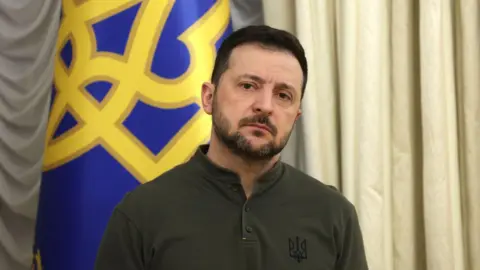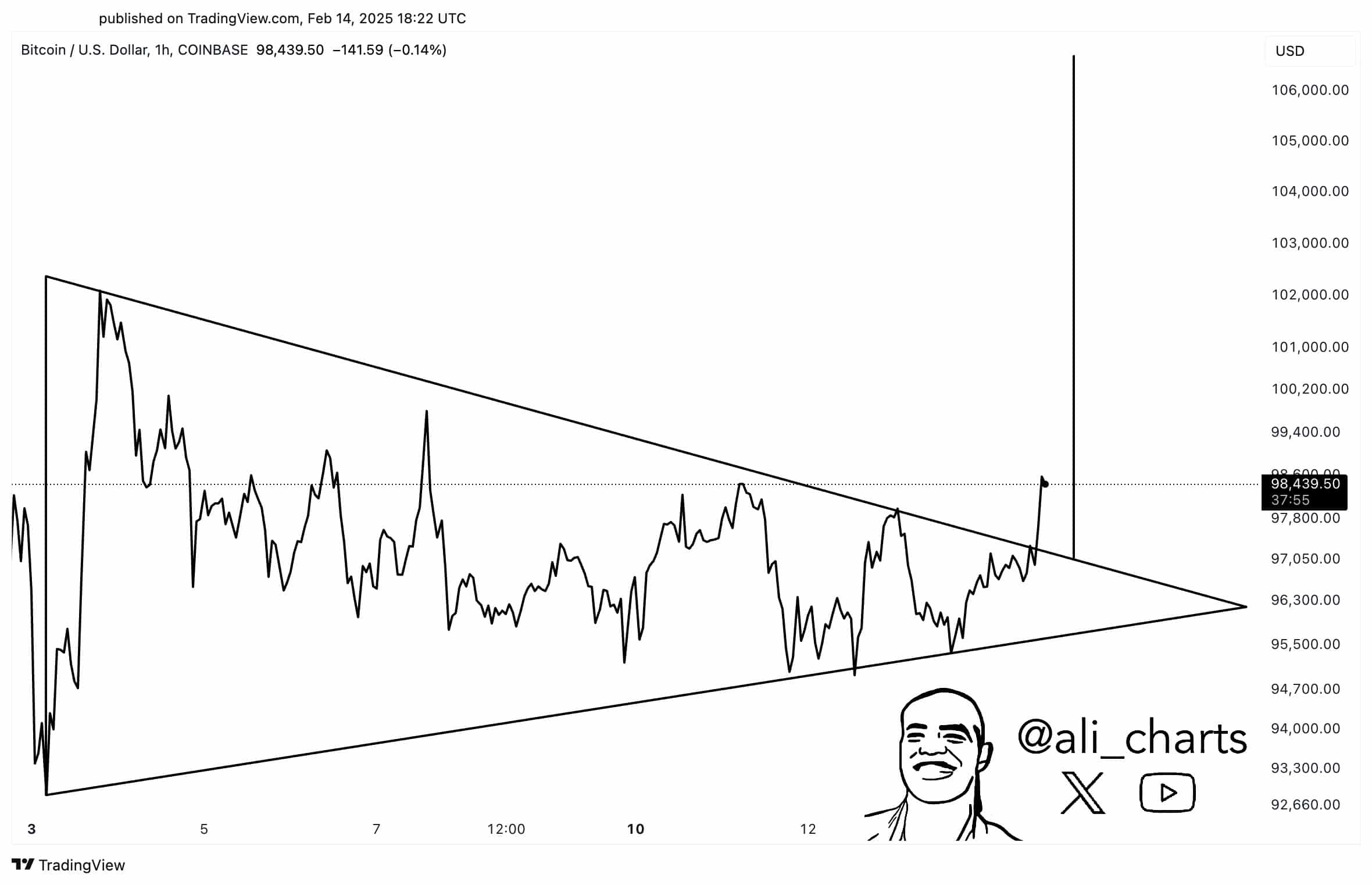Ukraine Will not Accept Peace Deals Without Involvement,Zelensky Says
Ukrainian President Volodymyr Zelensky has firmly stated that his nation will not endorse any peace agreements brokered solely by the United States and Russia,emphasizing the need for ukraine’s direct participation in any negotiations. This declaration follows a phone conversation between US President Donald Trump and Russian President Vladimir Putin,in which Trump expressed a “good possibility” of ending the war.
“We cannot accept it, as an independent country,” Zelensky asserted, underscoring Ukraine’s unwavering stance on this matter.
During their conversation, President Trump suggested that Ukraine’s accession to the North atlantic Treaty Organization (NATO) would be “not practical.”
This situation raises critical questions about the future of peace negotiations in the region. While both the US and Russia may have vested interests in reaching a resolution, the exclusion of Ukraine from the negotiating table threatens to undermine any potential agreement’s legitimacy and long-term effectiveness.
Zelensky’s stance reflects a broader trend of international diplomacy that increasingly recognizes the importance of involving all parties directly affected by a conflict. The principle of “nothing about us without us” has gained traction, particularly in situations where a nation’s territorial integrity and sovereignty are at stake.
Negotiating a durable peace in complex geopolitical conflicts necessitates a nuanced and inclusive approach.Excluding a key player like Ukraine from the table could lead to a superficial agreement that fails to address the root causes of the conflict and ultimately proves unsustainable.
Moving forward, it is imperative for the international community to encourage a multi-lateral dialogue that genuinely considers the perspectives and aspirations of all parties involved.This includes ensuring the active participation of Ukraine in any peace negotiations meant to secure a lasting and equitable resolution to the ongoing conflict.
Ukraine War: Trump Proposes Talks,Kyiv Rejects
Former U.S.President Donald Trump has proposed a meeting between Russian and ukrainian representatives in Munich, where a major security conference is taking place. “Russia is going to be there with our people,” Trump stated. “Ukraine is also invited, by the way. Not sure exactly who’s going to be there from any country but high-level people from Russia, from Ukraine and from the United States.”
Trump expressed his desire to re-engage with Russia, saying, “I’d love to have them [the Russians] back. I think it was a mistake to throw them out. Look, it’s not a question of liking Russia or not liking Russia.”
Though, Ukraine’s stance is resolute. President Volodymyr Zelensky, who engaged in a phone call with Trump on Wednesday, asserted, “Ukraine could not accept ‘any agreements [made] without us’.” He emphasized the need for Europe to be involved in the negotiations, stating, “Europeans needed to be at the negotiating table too,” and stressed that his priority was “security guarantees,” something he believes cannot be achieved without US support.
Ukraine Rejects Imposed Peace
Zelensky further warned against trusting Putin’s pronouncements of readiness to end the war, stating, “I also warned world leaders against trusting Putin’s claims of readiness to end the war.” Ukraine’s European allies echoed Zelensky’s sentiments, categorically rejecting any notion of a forced settlement on Kyiv.
UK Defense Secretary John Healey declared,”There could be ‘no negotiation about Ukraine without Ukraine,and Ukraine’s voice must be at the heart of any talks.'” German Chancellor Olaf Scholz similarly rejected a “dictated peace,” while his Defense Minister expressed concern over Washington’s apparent willingness to make “concessions” to the Kremlin. EU foreign policy chief Kaja Kallas accused Washington of “appeasement” towards Russia, warning, “We shouldn’t take anything off the table before the negotiations have even started because it plays to Russia’s court and it is what they want.”
Nato Membership and the Cost of Security
During his conversations,Zelensky advocated for Ukraine’s NATO membership,stating that it would be the “most cost-effective” option for its partners.
While specific details were not provided, this proposal highlights the crucial issue of security guarantees for Ukraine, which remains the core objective of the ongoing diplomatic efforts.
The situation in Ukraine remains tense,with no clear path towards a peaceful resolution. While Trump’s proposal for talks offers a glimmer of hope, Ukraine’s insistence on being a central player in any negotiations underscores the complexities involved in finding a lasting solution to this devastating conflict.
Trump Hints at putin Meeting in Saudi Arabia Amid Ukraine Peace Talks
Former President Donald Trump disclosed his intention to meet with russian President Vladimir putin in Saudi Arabia, suggesting a potential pathway for peace negotiations in the ongoing conflict in Ukraine. Speaking to reporters in the Oval Office on Wednesday, Trump stated, “He [Putin] wants the war to end, and I expect a ceasefire soon.” this proclamation comes after Trump conducted his first publicly acknowledged phone call with putin as the commencement of Russia’s full-scale invasion of Ukraine in 2022.
Direct Engagement and Potential for Ceasefire
Trump’s proposition to meet with Putin in Saudi Arabia marks a notable growth in the Ukraine crisis. While specifics regarding the meeting remain unclear, the former president’s assertion that Putin desires an end to the war and anticipates a ceasefire soon offers a glimmer of hope for a resolution. However, whether such a meeting would translate into tangible progress or merely serve as a symbolic gesture is yet to be steadfast.
Ukraine’s Role in peace Negotiations
Trump’s stance on Ukraine’s role in peace talks has sparked debate. When questioned about Ukraine’s status as an equal participant, he stated, “They have to make peace.” This comment has raised concerns among some quarters that Ukraine’s interests may not be adequately represented in any potential negotiations.
Conflicting Statements and Shifting Positions
Defense Secretary Pete Hegseth, speaking at a NATO summit on Thursday, offered a more nuanced outlook. He emphasized that peace negotiations would involve both Putin and Ukrainian President Volodymyr Zelensky. Hegseth characterized Trump as a skilled negotiator, highlighting his ability as a “perfect dealmaker.” Hegseth initially suggested that Ukraine reclaiming its pre-2014 borders was unrealistic and downplayed Ukraine’s potential NATO membership. However,he later clarified that “everything was on the table” during these discussions,led primarily by the former president.
Potential Compromises and US Involvement
Hegseth indicated that financial aid to Ukraine during negotiations could be a point of discussion, along with potential adjustments to US troop deployments in Europe. These potential compromises suggest the complexities inherent in seeking a resolution to the conflict.
The future trajectory of the Ukraine war remains uncertain. Trump’s willingness to engage with Putin offers a potential avenue for dialogue, but the success of any peace initiative hinges on numerous factors, including the willingness of both sides to negotiate in good faith and find mutually acceptable solutions.
The Evolving Landscape of the Ukraine Conflict
the ongoing conflict in Ukraine, a devastating war that began in 2022, is rooted in a complex history.following the 2014 ousting of Ukraine’s pro-Russian president, Russia took control of the Crimean Peninsula and provided support to separatist forces in eastern Ukraine.
Even though Russia initially attempted to seize the ukrainian capital, Kyiv, its plans were thwarted. Despite this setback, Russian forces have managed to occupy approximately 20% of Ukraine’s territory in the east and south, while conducting widespread air strikes throughout the country.
Ukraine, in response, has mounted its own counteroffensive utilizing artillery, drones, and ground assaults. The conflict has intensified in recent months, with Ukraine’s attacks extending into Russia’s Kursk region.
International Implications
this conflict has far-reaching implications for Europe and the world. It has triggered a global energy crisis, exacerbated food shortages, and raised fears of a wider military confrontation.
The international community has responded with widespread condemnation of Russia’s actions and imposing severe sanctions. Though, the conflict persists, leaving millions displaced and countless lives lost.
Looking Ahead
The future of the conflict remains uncertain. while Ukraine has shown remarkable resilience and determination, Russia continues to demonstrate its willingness to wage a protracted war.
“The situation is highly volatile and unpredictable,” noted a leading geopolitical analyst. “The outcome will depend on a complex interplay of factors, including military capabilities, international support, and internal pressures within Russia.”
Ending this conflict requires a multifaceted approach involving diplomatic negotiations, humanitarian assistance, and a commitment to upholding international law.




